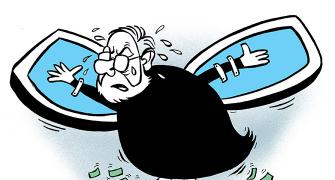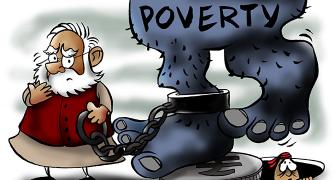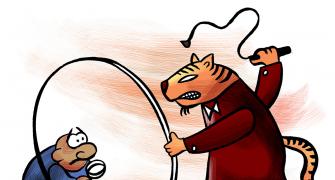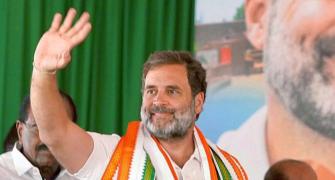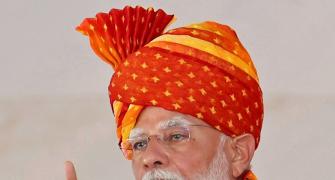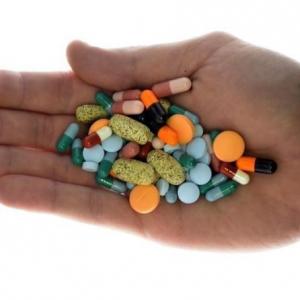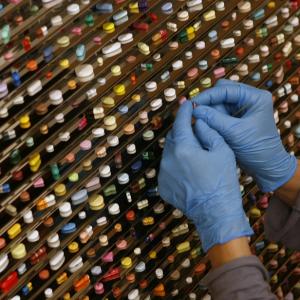The government plans to rationalise trade margins for many other medical devices, besides stents and knee implants.

Price cap and regulatory clampdown: These are the twin factors that kept the healthcare and pharmaceutical industry on its toes through the year.
Even as companies and associations have been busy protesting against the changing rules, the government maintained it was putting the common man first.
There's more to come. The government plans to rationalise trade margins for many other medical devices, besides stents and knee implants.
In a recent stakeholder consultation, domestic manufacturers were of the opinion that prices of devices could be halved.
Another suggestion from them was that the price could be based on tax incentive.
But multinationals wanted the cap to be on healthcare providers -- hospitals.
The move so far in medical devices
Out of the 20-odd devices which have been classified as drugs, two have come under the ambit of price control much against the industry’s wish.
First, the National Pharmaceutical Pricing Authority (NPPA) slashed the prices of coronary stents by 85 per cent.
The NPPA capped the price of all drug-eluting stents at around Rs 30,000, down from their earlier maximum retail price (MRP) of almost Rs 200,000.
Then came knee implants. The NPPA brought down the prices of orthopaedic knee implants by 50 per cent.
Lower prices of these devices brought cheer to the consumer as they would have to pay less for at least one component in their hospital bill.
For the industry, it was a bitter pill, an analyst said. Soon, the government was flooded with withdrawal applications from companies.
In the case of stents, the government had to invoke section 3(i) of the Drug Price Control Order, 2013, to ensure device makers do not opt out of the Indian market.
The provision was invoked for a period of six months ended August.
Once again, device makers moved applications for withdrawal.
The department of pharmaceuticals (DoP) had four applications for withdrawal, which is why it had to re-invoke section 3(i), a source said.
This provision suggests that no manufacturer can bring down the production of import of the commodity.
Pre-emptively, the department also invoked section 3 (i) on knee implant, the source said.
How it played out for drugs
While the medical devices sector faced trade margin erosion because of the government measures, drug firms, too, had their share of concerns.
Some of the tweaks didn’t hurt. For instance, the government decided to give licences in perpetuity, but undertake periodic risk-based assessments to ensure quality.
The government cited the ease of doing business to make the change. With this move, the amount of paperwork is expected to come down as companies needn’t apply for renewal every three years.
The industry saw some other steps as harsher. The proposed pharmaceutical policy stated that the trade margins ought to be rationalised.
As the government prepares to cap drug margins, there’s a demand from manufacturers, their lobbies, and traders.
They have asked the government to only cap trade margins for branded drugs.
Branded versus unbranded
An official from the pharma department said that all the stakeholders spoke in unison at a recent consultation meeting held by the government on the issue.
“These bodies were also of the opinion that the trade margins for unbranded drugs should not be considered, as that would mean non-availability of many crucial drugs in the hinterlands.”
Also, cracking the whip on companies as well as doctors with one move, the Centre made it mandatory for doctors to write generic names of drugs in prescriptions.
When the government came up with this directive through the Medical Council of India, industry felt that the pharmacist-manufacturer nexus will replace the doctor-manufacturer nexus.
Experts also felt this move would allow the chemist to replace one drug with another without the doctor’s consent.
The government plans to limit the number of brands of a drug a company can manufacture.
There are plans to bring an end to contract licensing or loan licensing. The DoP feels it “undermines the veracity of drug manufacturing and pricing practice”.
Why the Centre clamped down
The government had received complaints from various quarters that the trade margins for drugs range between 300 per cent and 5,000 per cent.
While the government went all out to bring down the trade margins, think tank NITI Aayog has been engaged in deliberations with the industry on the subject.
In a recent submission to the Aayog, industry representatives said that drugs with inflated margins were pure generics and constituted only four per cent of the industry.
A senior industry executive remarked that the entire industry should not be punished for the sins of few and the government should consider other options to solve the issue instead of capping margins.
It all began in 2015 after the Maharashtra Food and Drug Administration raised a complaint against a cough syrup to the NPPA for inflating the MRP by 100-150 per cent in order to lure the chemist to sell the drug.
In fact, the Prime Minister’s Office had, at that point in time, observed that at least 60 drugs of one manufacturer had been sold with margins above 1,000 per cent.
Of these, nine were scheduled medicines.
In another observation, the government had found that the cancer treatment drugs with a wholesaler price of Rs 1,900 were being sold at Rs 7,600 to patients.
In fact, in the wake of such high prices of unbranded generics, the report by the NPPA by the then chairman Injeti Srinivas had recommended making prescription of generics mandatory.
The recommendation was for single-ingredient drugs. The committee had also recommended de-branding single-ingredient drugs.
During earlier discussions with stakeholders in 2015, the industry had stated that some of the drugs that were under the government purview for capping included those to treat HIV, cancer, gynaecological products, and vaccines.
They also stated that there would be shortage of these drugs.
Online woes
Meanwhile, another important regulation in the making is for the operation of online pharmacies.
A recent draft put out by the drug controller’s office stated that the intention was to ensure safe online purchase of drugs.
The drug controller had stated that only low-risk drugs could be sold online.
By introducing regulations, online pharmacies feel that there will be level playing between offline and online pharmacies.
Once these regulations are in place, even offline pharmacies will have to report their sales in the centralised portal, which will be monitored by the government.
There are no protests yet against the move, but things could change.
Photograph: Shailesh Andrade/Reuters.



